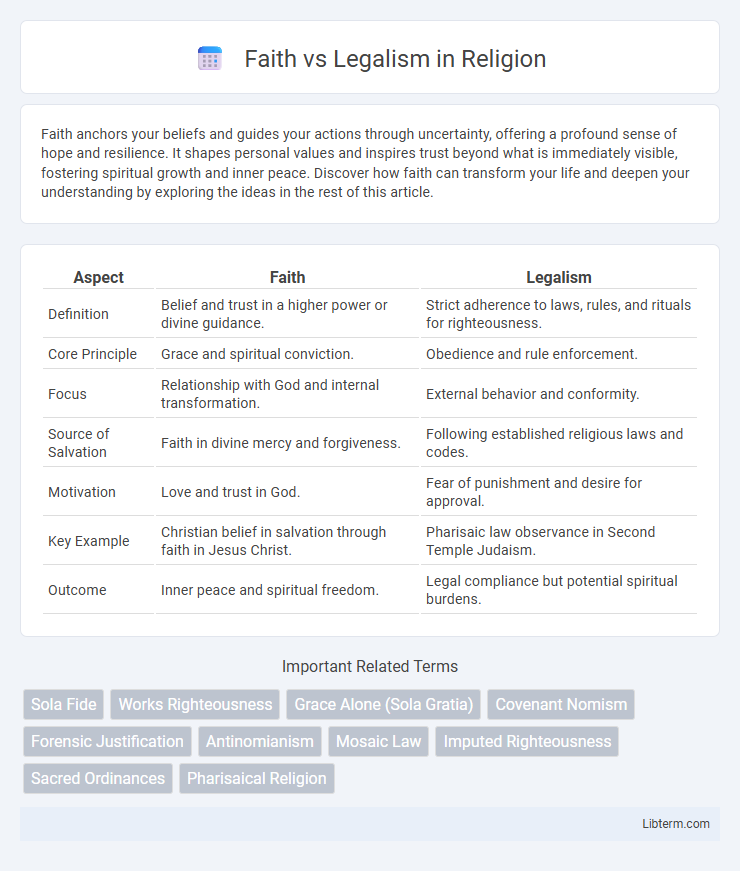Faith anchors your beliefs and guides your actions through uncertainty, offering a profound sense of hope and resilience. It shapes personal values and inspires trust beyond what is immediately visible, fostering spiritual growth and inner peace. Discover how faith can transform your life and deepen your understanding by exploring the ideas in the rest of this article.
Table of Comparison
| Aspect | Faith | Legalism |
|---|---|---|
| Definition | Belief and trust in a higher power or divine guidance. | Strict adherence to laws, rules, and rituals for righteousness. |
| Core Principle | Grace and spiritual conviction. | Obedience and rule enforcement. |
| Focus | Relationship with God and internal transformation. | External behavior and conformity. |
| Source of Salvation | Faith in divine mercy and forgiveness. | Following established religious laws and codes. |
| Motivation | Love and trust in God. | Fear of punishment and desire for approval. |
| Key Example | Christian belief in salvation through faith in Jesus Christ. | Pharisaic law observance in Second Temple Judaism. |
| Outcome | Inner peace and spiritual freedom. | Legal compliance but potential spiritual burdens. |
Understanding Faith: A Transformative Relationship
Faith embodies a transformative relationship that transcends mere rule-following, fostering deep spiritual connection and personal growth. Unlike legalism, which emphasizes strict adherence to laws and rituals, faith centers on trust, grace, and internal change rooted in divine love. This relational dynamic empowers believers to live authentically, motivated by heartfelt conviction rather than external compulsion.
Defining Legalism: Rules Over Relationship
Legalism prioritizes adherence to strict rules and regulations over a genuine relationship with God, emphasizing external actions rather than internal faith. It often leads to judgmental attitudes and spiritual pride, as individuals focus on earning favor through works instead of grace. In contrast, faith centers on trust in God's promises and transformational grace, fostering a heartfelt connection beyond mere rule-keeping.
Historical Roots of Faith and Legalism
The historical roots of faith trace back to ancient religious traditions emphasizing trust in divine grace and spiritual belief systems, while legalism originated from strict adherence to codified laws and moral codes, notably within Judaic and early Christian contexts. Faith emerged as a transformative principle during the Reformation, challenging the rigid legalistic frameworks that dominated religious practice. Legalism historically aimed to maintain order and uniformity through external observance, often contrasting with faith's internal reliance on personal conviction and spiritual relationship.
Key Differences: Spirit vs. Letter of the Law
Faith emphasizes the spirit of the law, focusing on inner transformation and grace as taught in the New Testament, particularly in Paul's letters to the Romans and Galatians. Legalism centers on strict adherence to the letter of the law, prioritizing outward compliance and rituals without addressing the heart's intent. This fundamental difference shapes religious practice, with faith fostering a relationship with God and legalism enforcing rule-based behavior.
Biblical Perspectives on Faith and Legalism
Biblical perspectives distinguish faith as trust in God's grace and legalism as reliance on strict adherence to the law for righteousness. Scriptures like Romans 3:28 emphasize justification by faith apart from works of the law, highlighting faith's central role in salvation. Legalism is portrayed as undermining the gospel message by adding human rules that cannot secure salvation, contrasting with the freedom found in faith in Christ.
The Dangers of Legalism in Spiritual Life
Legalism in spiritual life imposes rigid rules and external rituals, leading to judgmental attitudes and spiritual pride rather than genuine faith. It diminishes the transformative power of grace by replacing trust in God's mercy with reliance on human effort. This mindset fosters legalistic bondage, discourages authentic relationship with God, and hinders true spiritual growth and freedom.
The Role of Grace in True Faith
True faith is fundamentally rooted in the acceptance of grace, which is the unmerited favor granted by God, distinguishing it from legalism's reliance on strict adherence to rules. Grace empowers believers to live transformed lives through forgiveness and renewal rather than earning salvation through works. Embracing grace fosters a genuine relationship with God, where faith flows naturally without the binding constraints of legalistic demands.
How Faith Liberates, Legalism Restricts
Faith liberates by fostering a deep, personal relationship with God, empowering believers to embrace grace and spiritual freedom without fear of judgment. Legalism restricts by imposing rigid rules and external standards that create bondage, guilt, and a performance-based approach to righteousness. This contrast highlights how faith leads to inner transformation, while legalism confines through obligation and fear.
Recognizing Legalistic Patterns in Modern Religion
Recognizing legalistic patterns in modern religion involves identifying rigid rule-following that prioritizes external behaviors over internal faith and spiritual growth. Legalism often manifests through excessive emphasis on rituals, dogmatic interpretations, and judgmental attitudes that constrain personal freedom and authentic relationship with the divine. Distinguishing faith-based spirituality from legalism requires examining whether religious practices foster grace, compassion, and transformation rather than mere adherence to prescribed codes.
Nurturing Genuine Faith in a Legalistic World
Nurturing genuine faith in a legalistic world requires emphasizing grace and personal relationship with God over rigid rule-following and external rituals. True spiritual growth emerges when believers internalize faith principles rather than adhering to mere legalistic standards or superficial compliance. Encouraging transformational faith fosters authentic obedience motivated by love, not fear of condemnation.
Faith Infographic

 libterm.com
libterm.com